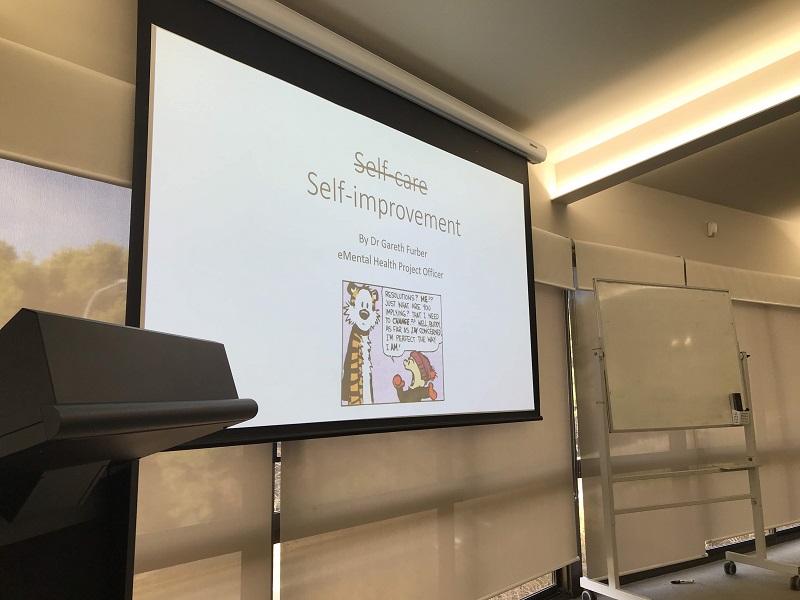Myself and Ali and Ben from OASIS got to speak to the new cohort of Flinders Wellbeing Ambassadors last night.
Whilst applications for the ambassador roles are now closed, you can learn a bit more about the program from this post we put up earlier in the year. Put simply, the role of the ambassadors is to contribute directly to the various wellbeing initiatives around the university. This means engaging with students on days like RUOK day, providing feedback to the Health service on the issues facing students and developing their own wellbeing events and initiatives.
Like last year’s group, the 2019 cohort is a diverse and strong group. Students from a range of topics, at different stages of their degree. Diverse in age, gender and cultural background, the students share a common interest in taking an active role in improving the mental health of their peers. I’m always quietly amazed at how generous and compassionate people can be.
My role last night was to talk about self-improvement and mental fitness, which of course I didn’t mind doing at all, as I like the topics and the sound of my own voice.

I had two main goals with my presentation.
First, I wanted to show that the conversation around mental health doesn’t just have to focus around distress, mental illness and help-seeking. Instead I pushed an agenda of getting people to think about the ways they want to make themselves stronger, faster, smarter, more efficient. Being mentally healthy is not just about dealing with distress. It is also about performing to the best of your abilities, embracing opportunities to improve and helping others do the same.
I also wanted to get across the point that as ambassadors, their role isn’t to act as counsellors, but to act as role models. This doesn’t mean being the ‘perfect student’. But it does mean demonstrating in the way they live their own lives a committment to psychological health and wellbeing. I liken it to going to see a health professional and pleasantly discovering they live their own advice. The dietician whose lunch looks healthy. The physiotherapist who rides their bike to work. The psychologist who engages in regular mindfulness.
Whilst I get the usual butterflies when presenting, I actually relish these opportunities to speak – even when they go badly. This is because I am trying to get better. Get better at presenting. Get better at communicating complex psychological topics to those who haven’t trained in psychology. Get better at motivating people to consider the possibility that self-improvement is a worthwhile agenda to pursue in their own lives. The only way to do this is to constantly refine my material and present regularly to see which bits are resonating and which bits are not.
Last night I definitely felt as though I was honing in on a clearer message, although my presentation was too long (sorry Ben, for eating into your time) and weighted too much on the background information and not the specifics of mental fitness. So this morning I’ll spend some time refining the narrative and presentation. I did this recently on my handout on Mental Fitness if you want to learn more about it.
My own goals aside, last night was also the opportunity to see Ali and Ben work. Ali is the wellbeing promotion officer at OASIS. Her job is to help organise and run wellbeing related events around the university in collaboration with other groups like FUSA and Flinders One. Ali is the person responsible for days like University Mental Health Day coming up on the 1st May, Harmony Day in March and RUOK day in September.
Ali is a natural when it comes to working with groups. Relaxed, friendly, warm and genuinely interested in the welfare of each participant in the group. She has a natural knack for encouraging people in what they do. I know that when I speak with her, I always leave the conversation feeling validated and appreciated.
Ben is the coordinator of OASIS and a part-time counsellor. His job last night was to talk about health promotion and encourage the group to start thinking about the types of messages we want to get across to students on days like University Mental Health Day. This is harder than you might imagine. For example, how do you get the balance right between talking about mental illness and ensuring those that are struggling can reach out, but at the same time also promoting the idea of positive mental health? These kinds of questions are really relevant as we lead up to University Mental Health Day.
Like Ali, Ben is a natural in group situations. He explains concepts clearly and immediately invites people into a conversation around those concepts. His presence is one that leaves you feeling calm and happy. It is an honour to be able to work with these two.
Enough about yourself Gareth, where can I find these ambassadors?
If you want to learn more about the program and the roles of the ambassadors, contact Ali Barnes on abarnes@flinders.edu.au
As for the ambassadors themselves, you will likely first see them at events as part of University Mental Health Day.
You might also just meet them as part of your everyday interactions at University. Judging by the people I met last night, you’ll be very fortunate to run into them 🙂